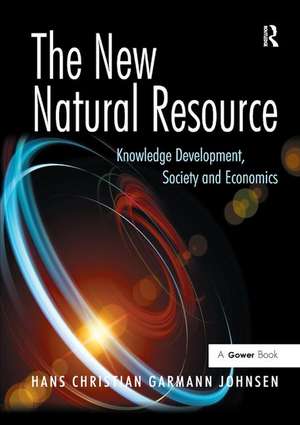The New Natural Resource: Knowledge Development, Society and Economics
Autor Hans Christian Garmann Johnsenen Limba Engleză Paperback – 31 oct 2016
| Toate formatele și edițiile | Preț | Express |
|---|---|---|
| Paperback (1) | 331.87 lei 6-8 săpt. | |
| Taylor & Francis – 31 oct 2016 | 331.87 lei 6-8 săpt. | |
| Hardback (1) | 798.55 lei 6-8 săpt. | |
| Taylor & Francis – 5 iun 2014 | 798.55 lei 6-8 săpt. |
Preț: 331.87 lei
Preț vechi: 379.23 lei
-12% Nou
Puncte Express: 498
Preț estimativ în valută:
63.50€ • 66.48$ • 52.54£
63.50€ • 66.48$ • 52.54£
Carte tipărită la comandă
Livrare economică 05-19 aprilie
Preluare comenzi: 021 569.72.76
Specificații
ISBN-13: 9781138228085
ISBN-10: 1138228087
Pagini: 304
Dimensiuni: 174 x 246 x 23 mm
Greutate: 0.45 kg
Ediția:1
Editura: Taylor & Francis
Colecția Routledge
Locul publicării:Oxford, United Kingdom
ISBN-10: 1138228087
Pagini: 304
Dimensiuni: 174 x 246 x 23 mm
Greutate: 0.45 kg
Ediția:1
Editura: Taylor & Francis
Colecția Routledge
Locul publicării:Oxford, United Kingdom
Public țintă
Professional Practice & DevelopmentNotă biografică
Hans Christian Garmann Johnsen is a professor in the Faculty of Economics and Social Sciences at the University of Agder in Norway and an adjunct professor at Gjøvik University College. Professor Garmann Johnsen is a specialist in the study of working life and innovation and is the Centre Leader at the Centre for Advanced Studies in Regional Innovation Strategies (RIS) at Agder. He has an MBA from the Norwegian School of Economics and Business Administration and gained his PhD at the Copenhagen Business School. He has been a visiting scholar and fellow at several universities including UC Berkeley and Cornell in the USA and Kingston University in the UK. For 15 years Garmann Johnsen has been involved in a national research programme into collaborative innovation. He has written and presented papers and authored journal articles published worldwide and co-edited the book, Creating Collaborative Advantage.
Recenzii
’This is an ambitious and illuminating book, based on broad and deep knowledge of the international literature, and grounded in practical engagement in research. Without offering a grandiose overview, in a series of essays Hans Christian Garmann Johnsen makes valuable links between social theory and the new challenges of the knowledge society. Readers will find familiar starting points, and new connections.’ Richard Ennals, Kingston Business School, Kingston University, UK ’It is a commonplace that knowledge is a social phenomenon. However, in this far-reaching and learning treatise, Hans Christian Garmann Johnsen explores the sociality of knowledge in a way that goes very substantially beyond the sociology of knowledge. Johnsen’s exploration takes him from Dilthey and Husserl to Hayek and Popper to Argyris and Richard Florida. Many new and fertile ideas are suggested when Johnsen wrestles with the thoughts of intellectual giants, past and present.’ Nicolai J. Foss, Copenhagen Business School, Norwegian School of Economics and Warwick University
Cuprins
Introduction Knowledge and Society: An Introduction; Part I The Epistemological Foundation of Knowledge; Chapter 1 Sociology of Knowledge Development; Chapter 2 Subjective Reflexivity and Knowledge; Chapter 3 Communicative Rationality; Part II Knowledge in Social Structures; Chapter 4 How Science Makes Knowledge; Chapter 5 Economic Thought, Market and Knowledge; Chapter 6 Knowledge Organisations: Developing Knowledge in Practice; Chapter 7 Cultural Knowledge and Market Development; Chapter 8 Modernist Criticisms and Development of Social Knowledge; Part III Knowledge Development in a Liberal Society; Chapter 9 Knowledge, Market and Social Justice; Chapter 10 Knowledge, Social Systems and Legal Order; Chapter 11 Knowledge and Democracy; concl Concluding Reflections;
Descriere
This is a book about the role of knowledge in social and economic development. There is a need to address the process of developing knowledge as a social process and The New Natural Resource starts with the argument that knowledge is inherently a social phenomenon. This allows us to discuss the relation between individual opinions and what is regarded as knowledge. It also allows us to see how economic and political and democratic processes are interrelated. Acknowledging that we are more dependent on contesting processes of knowledge development in society implies that we should address how society as a whole is able to legitimize what it regards as the right kind of knowledge.
